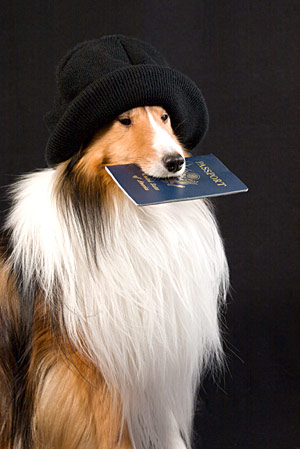

As seen in Modern Dog Magazine


The Pet Travel Scheme ("PETS")

The Pet Travel Scheme ("PETS") is a scheme which allows animals to travel easily between member countries without undergoing quarantine.
A Pet Passport is a document that officially records information related to a specific animal, as part of that procedure. The effect is to drastically speed up and simplify travel with animals, and transport of animals, between member countries, compared to previous procedures, if the regulations are followed.
The Pet Travel Scheme (PETS) is the system that allows pet dogs, cats and ferrets from certain countries to enter the UK without quarantine as long as they meet the rules.
It also means that people in the UK can take their dogs, cats and ferrets to other European Union (EU) countries, and return with them to the UK.
They can also, having taken their dogs, cats and ferrets to certain non-EU countries, bring them back to the UK without the need for quarantine. The rules are to keep the UK free from rabies and certain other diseases.
PETS was originally introduced for the benefit of animals entering or returning to the United Kingdom from other European Union countries, since historically the UK had very strong controls to safeguard against rabies including a compulsory 6 month quarantine period on imports of many animals.
On October 1, 2001, several European Union countries introduced the PETS scheme, under which animals from any member country may freely travel (with the correct procedure) to any other member country on approved carriers.
Every country has different requirements, both for export and import of animals, although some features are common to all.
PETS Common Features
All countries:
- Subcutaneous (below the skin) microchip implant that meets ISOP specification.
- Certified rabies vaccination, with some kind of prior period of time or evidence the vaccination is working (commonly blood serology tests to confirm the vaccination has "taken" and a delay of some months to confirm the animal is rabies free initially)
Some countries:
- Animal treated for ticks, fleas and tapeworms between 24 and 48 hours before boarding the outbound transport. The time limit is usually enforced strictly (ie no less than 24 hours and no more than 48 hours before check-in)
- Vet's letter or certificate confirming fitness to travel and/or no obvious signs of disease.
- Government certification that the vet's export documentation and certificates are in order for travel.
- Sometimes certain carriers or import/export points only, will allow animals.
In some countries the formal passport is needed. Others will accept documentation in any form, so long as it is clearly evidential of the procedure being followed. Usually the animal and its papers are checked thoroughly both on boarding or export, and again upon arrival.
The Pet passport alone can be used to enter some countries if it records all relevant information (eg the UK), but it will not suffice to enter many countries. For instance Guatemala, in common with almost every country operating such a scheme, demands that all imported pets have a rabies vaccination, but will not accept the Pet Passport as proof of said vaccination. They need to see the proof of the rabies in the animal's vaccination records.
Travel from outside Europe to a European Country
Tick and tapeworm treatment is needed between 24 and 48 hours prior to departure.
Specific Country Regulations
United Kingdom
- Tick and tapeworm between 24 and 48 hours prior to arrival (strict).
- Animals cannot be flown into the country as 'checked baggage', on airlines, but only as cargo.
Export from the USA
Animals being exported must have a vet examination and certificate, which must also be certified valid by the USDA.
Other Helpful Information
The PETS scheme is not yet standardized therefore leading to much confusion. It is important that each part of the journey between any two countries be researched separately to ensure that the animal will be accepted for travel upon arrival at the departure point.
The major delay in obtaining a pet passport is the time requirement for the rabies vaccination.A properly prepared cat or dog may be imported without quarantine into the United Kingdom from the approved countries listed under the Pet passport scheme, but only by an authorized transport company.
Things to Remember:
- 1. An animal may get a valid rabies vaccination and serology check, and then apply for a passport on the spot, at a later date.
- 2. An animal whose rabies vaccination is allowed to go out of date (typically 1-2 years) by even one day, without a booster, must start with a new vaccination and delay.
- 3. Because PETS is European wide, the regulations may differ for travel within, and outside, Europe. Pet guardians should pay strict attention since the requirements for travel to a destination may be quite different from the requirements upon returning.
- 4. A suitable and carrier-approved travel crate may be required, which must have the correct food and water containers as set out by the relevant bodies.
- 5. Animals should not be sedated for air travel, since altitude can affect medications. Most airlines will not accept tranquilized animals nowadays.
- 6. Larger animals may be restricted to airline routes which can accommodate their crates. Not all airlines will carry animals, and charges vary widely - check with each airline before travel.
- 7. Some routes will not fly animals if the temperature is adverse, or in certain months, due to health risks.
- 8. You may need to check with a vet or the consulate of the relevant countries to confirm details.
- 9. It is recommended to double check and document all information supplied to you about your pet.
- 10. The UK restricts incoming flights to only ship animals as cargo.